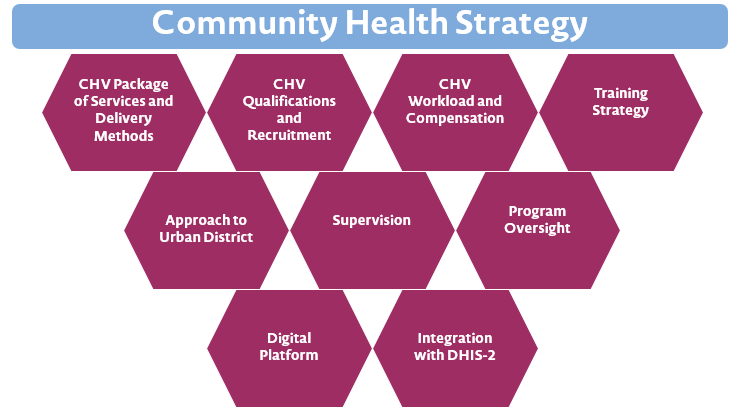As announced in June 2018, D-tree International is thrilled to have received support from the Fondation Botnar and Human Development Innovation Fund to support the Zanzibar Ministry of Health and Local Government in designing and rolling-out a national, digitally supported community health volunteer (CHV) program in Zanzibar with the aim of improving maternal, newborn, and child health, including early child development. Over the past few months, we have worked closely with the Ministry of Health (MOH), district health teams, and partner organizations to develop a joint vision for the community health program in Zanzibar and supportive strategies to achieve the program aims. The vision for Zanzibar is that the government will lead and coordinate the deployment of a single cadre of CHVs across Zanzibar to support community health promotion; health screening and planning; and client referrals to health facilities for acute or routine care. In doing so, the government of Zanzibar will increase community demand for health services and progress toward achieving universal access to primary health care services. We are currently supporting the Zanzibar Ministry of Health to update its National Community Health Strategy to reflect this vision and detail the supportive strategies to achieve it. The updated Community Health Strategy is expected to be finalized in early 2019.

A digital platform will support each level of the upcoming national community health system. CHVs will utilize a mobile application as they interact with beneficiaries, which will guide CHV workflows, provide tailored care for the needs of each client, schedule client visits, track CHV performance, and collect data as a byproduct of CHVs’ work. The CHV application will link with a CHV supervisor application with which supervisors can track and encourage CHV performance, review client referrals, and communicate with district health teams to escalate challenges. District health teams and MOH staff will access dashboards, which compile all the data gathered through the CHV and supervisor applications, to track and assess program status, including CHV performance and achievement of key indicators. District health teams will be able to review client feedback on health facility services, which will inform specific actions they can take to improve the quality of care at facilities. The program data will be integrated into the MOH health management information system—DHIS-2—to empower the MOH with national level community health data for the first time.
Given the national CHV program vision and the supportive digital platform required, over the past few months we have assessed a variety of software platforms to understand which would best support the envisioned system and meet government requirements around access, maintenance, and integration. We are excited to announce that we have selected the Community Health Toolkit as the software platform best suited to support the national CHV program in Zanzibar.
The Community Health Toolkit (CHT), launched in late November as a global good, is a collection of open source technologies that support health workers in providing quality care at the community level and strengthen health systems through empowering supervisors and health decision-makers with data from health worker interactions. While there are a number of features that led to its selection, here are the three aspects we are most excited about:
-
Transparency and Accessibility. The Community Health Toolkit is a fully transparent, open source and open access collaboration seeking to make the code, content, learnings and other material fully available to the global community. This means that all documentation, coding, roadmap, etc., will be freely available. As the Ministry of Health will manage and maintain the system, an openly accessibly system—free of charge—was a key requirement to foster sustainability, adaptation, integration with existing systems, and local ownership.
-
Community of Practice. As the MOH begins using the CHT, having a global community of practice around the software will support their ability to develop applications, add features, and continually adapt the platform as needs change over time. Although D-tree, in partnership with Medic Mobile, will build the MOH’s capacity to utilize the platform and provide in-person support as the system launches and takes shape in Zanzibar, having a community of practice will ensure that the MOH receives on-going support and decrease government dependency on donor or partner support run the platform.
-
Designed to Strengthen Community Health Systems. The technologies available through the CHT have already been implemented and tested in over 20 countries with thousands of community health workers and beneficiaries. Medic Mobile—the organization that developed the CHT’s core applications to date and the technical lead of the CHT—has employed a human-centered design approach throughout development and implementation to maximize the technology’s relevance to user contexts and needs. We believe that building Zanzibar’s CHV platform from such well-grounded technologies will enhance the MOH’s ability to succeed in establishing a quality community health program.
Last week we had the opportunity to collaborate with Medic Mobile in sharing the Community Health Toolkit with key units of the Ministry of Health—including the Health Promotion Unit, Information Communication and Technologies (ICT), and Health Management Information Systems. The MOH teams had an opportunity to learn about the technology, review a demonstration, and ask questions. The Medic Mobile team has already begun building our team’s capacity to build tools with the CHT and our team is in conversations with the MOH to select and train key MOH ICT staff to work hand-in-hand with us to develop the system for Zanzibar. We are appreciative of the MOH’s commitment to improving community health services in Zanzibar and admire their stewardship in employing a digital system to strengthen these efforts.

